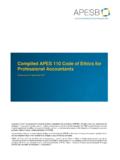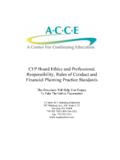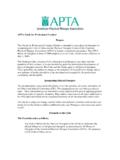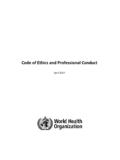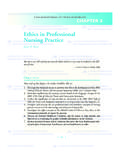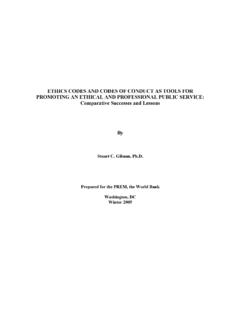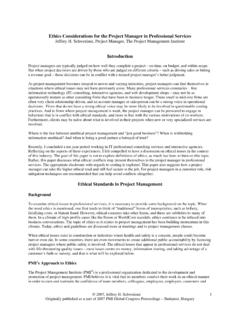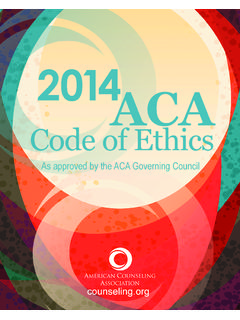Transcription of Guide to Professional Conduct and Ethics for …
1 Guide to Professional Conduct and Ethicsfor Registered Medical Practitioners8th Edition 2016 PartnershipPerformancePracticeContentsFo reword 5 Chapter 1: Purpose of the Guide 61 How to use this Guide 72 Professional misconduct and poor Professional performance 7 Chapter 2: Professionalism 93 The Three Pillars of Professionalism 104 Partnership 105 Practice 116 Performance 12 Chapter 3: Partnership 147 Dignity of the patient 158 Equality and diversity 159 Consent general principles 1510 Capacity to consent 1511 Information for patients 1612 Timing of consent process 1713 Responsibility for seeking consent 1714 Emergency situations 1715 Refusal of treatment 1716 Advance healthcare plan or directive 1817 Consent to genetic testing 1818 Children and young people 1819 Personal relationships with patients 2020 Using social media 2021 Relationships between colleagues 2122 Delegation and referral 2123 Handover 2124 Healthcare resources 2225 Clinical trials and research 22 Chapter 4.
2 Practice 2426 Protection and welfare of children 2527 Protection and welfare of vulnerable persons 2528 Reporting of alleged historic abuse 2529 Confidentiality 2530 Disclosure with consent 2631 Disclosure without consent 2732 Disclosure after death 2733 Medical records 2734 Recording 2835 Physical and intimate examinations 2836 Continuity of care 2837 Retirement and transfer of patient care 2938 Referral of patients 2939 Refusal to treat 3040 Medical reports 3041 Certification 3142 Prescribing 3143 Telemedicine 3244 Provision of information to the public and advertising 3245 Nutrition and hydration 3346 End of life care 3347 Assisted human reproduction 3448 Abortion 3549 Conscientious objection 3550 Patients who pose a risk of harm to others 3651 Treatment of prisoners 3652 Restraint 3653 Emergencies 3654 Registration 3755 Premises and practice information 3756 Employment issues 3757 Professional indemnity 3858 Health and well-being of doctors 3859 Concerns about a colleague s abuse of alcohol or drugs or other health problems 3860 Treatment of relatives 3861 Medical ionising radiation 3962 Managing conflicts of interest 3963 Doctors in management roles 40 Chapter 5.
3 Performance 4164 Culture of patient safety 4265 Raising concerns 4266 Maintaining competence 4267 Open disclosure and duty of candour 4368 Teaching and training 4369 Training and trainees 4370 Teaching and medical students 4371 Allowing school students and others access to patients 4472 Language skills 4473 Concerns about colleagues 44 Appendix A: Principles of Freedom of Information (FOI) Legislation 45 Appendix B: Confidentiality Relevant Legislation 47 Appendix C: Information for Patients before giving Consent 49 Foreword Professionalism is at the core of the patient - doctor relationship and is absolutely fundamental for patient safety and the delivery of high-quality health care. The purpose of this 8th edition of the Guide to Professional Conduct and Ethics for Registered Medical Practitioners is twofold.
4 It provides principles-based guidance to doctors on a wide range of scenarios which are likely to arise over the course of their Professional careers and also clarifies for patients the standards of care which they should expect from their doctor. Having sought and received feedback from members of the public, the profession and our partner organisations within the health sector, and reviewing five years of complaints to the Medical Council, we have revised and updated our guidance to include the most pertinent issues affecting patients and doctors. As the last ethical Guide was published in 2009, the updated Guide reflects the evolving nature of medical practice. For example, it has been updated with some of the more contemporary issues of concern to patients and members of the profession; including guidance on social media, equality and diversity, doctors in management roles and training and trainees.
5 Another significant development in this Guide is the extended guidance on professionalism. We have identified three pillars of professionalism . These are values, principles and behaviours we expect of all doctors from the moment they enter medical school right through until retirement, so that the highest possible standard of care is provided to patients. It is important to stress that this Guide is not a legal code; rather it sets out the principles of Professional practice and Conduct that all doctors registered with the Medical Council are expected to follow and adhere to, for the benefit of the patients they care for, themselves and their colleagues. The language we have used has been revised to make our guidance as practical as possible and to remove any potential ambiguity so that doctors and patients are clear on what we expect.
6 This document is designed to underpin more detailed practice guidance for doctors, who also have a duty to ensure compliance with all laws and regulations pertaining to their practice. The Medical Council is grateful to those who participated in the consultation process. Without their valuable and insightful contributions, we would not have been in a position to reflect such a wide range of views in this Guide . To this end, we would particularly like to thank members of the Ethics and Professionalism Committee, Ethics Drafting Working Group, Council and staff for engaging in such a consultative and considered process. We know from our own research that doctors remain the most trusted profession in Ireland and we look forward to supporting the continuation of this trust and satisfaction by further clarifying the standards that underpin good patient care in this Freddie Wood Dr Audrey Dillon President Vice President and Chair, Ethics and Professionalism Committee5 Chapter 1: Purpose of the guide7 Chapter 1 - Purpose of the guide1 How to use this This Guide sets out the principles of Professional practice that all doctors registered with the Council are expected to follow.
7 You should use your judgement to apply the principles to your practice and the situations you face, including when you are making clinical The Guide is intended to help you make good judgments about the situations that arise in your practice. It is not a code or a set of rules that dictates how you should behave; nor does it try to list every circumstance you may Your responsibility is to help the sick and injured and to give care and treatment that meets your patients needs. Medical care must not be used as a tool of the State. As a doctor, you must be free to make judgements about your patients clinical needs and to give appropriate treatment without political pressure. Equally, you must exercise your clinical skills and judgement in your patients interests, without allowing religion, nationality, gender, race, ethnicity, age, politics, socio-economic grouping or disability to affect in a negative way the care or treatment you give.
8 You should not let your Professional actions be influenced by any personal In the Guide we use the term you must where there is an absolute duty on you to comply with the principle that follows. We use you should to describe best practice in most circumstances, accepting that it may not always be practical to follow the principle or that another approach may be appropriate in particular circumstances. You should use your judgement in such cases. The Guide includes links and references to legislation to help you understand both your legal and ethical obligations. References to the law are included where relevant, but this is not a definitive statement of the law, and may become out of date.
9 As a doctor, you have a duty to keep up to date with legislation, legal developments and case law that could affect your practice. 2 Professional misconduct and poor Professional performance Professional misconduct Conduct which doctors of experience, competence and good repute consider disgraceful or dishonourable; and / Conduct connected with his or her profession in which the doctor concerned has seriously fallen short by omission or commission of the standards of Conduct expected among 1 - Purpose of the Poor Professional performance, as defined in the Medical Practitioners Act 20071, means a failure by the practitioner to meet the standards of competence (whether in knowledge and skill or the use of knowledge and skill or both) that can reasonably be expected of medical practitioners practising medicine of the kind practised by the practitioner.
10 This has been interpreted by the Supreme Court to mean a serious failure As a doctor, you should be aware that complaints may be made against you to the Medical Council under the Medical Practitioners Act 20073. There are a number of grounds on which complaints can be made, such as: Professional misconduct, poor Professional performance, including complaints about unacceptable behaviour or poor communication, a physical or mental disability, including addiction to alcohol or drugs, which may impair the doctor s ability to practise medicine or a particular aspect of medicine, a failure to comply with a condition imposed by the Council, or with an undertaking made to the Council, or to take an action which has previously been agreed with the Council, a contravention of the Medical Practitioners Act 2007 or of the regulations or rules made under it, or a conviction in the State for an offence where the accused has a right to a jury.
